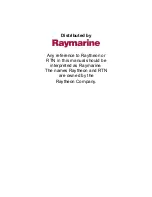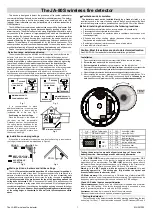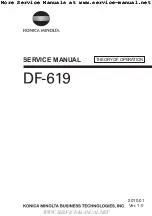
3. Components of an FLX display system
3.3
FLX-NNI Controller
Introduction FLX-NNI Controller
The housing of the FLX-NNI Controller has a width of 19” (480mm) and a height of 5,25” (133mm) which is the equivalent of 3 rack
units U (1U = 1,75” = 44,45mm). These dimensions makes the FLX-NNI Controller suitable to build in a standard 19” rack. The
rear side of the FLX-NNI Controller is equipped with a power input socket (type C14) on which the required input voltage of 100-240
VAC; 1-0,5A; 50-60 Hz (0,5 amps at 230VAC) is applied to. The FLX-NNI Controller is not designed for outdoor use and thus must
installed indoor.
The front side of the FLX-NNI Controller consist in an ON/OFF switch, an LCD display, a navigation button, one data input socket,
two data output sockets, and eight data output ports (type RJ45). With the LCD display and navigation button you can retrieve/mod-
ify several settings/values of the FLX-NNI Controller and of the connected FLX-HUB units. The data input socket (IN) has to be
connected with the output port of the DX-700 Digitizer or with one of the two data output sockets (TRU) of the previous FLX-NNI
Controller. Each data output port can be connected to one FLX-HUB. The data output ports are numbered from 1 to 8, left to right
and top to bottom.
The FLX-NNI Controller can only be used with the new generation of DX digitizers like the DX-100 and DX-700 Digitizer. The re-sync
unit detects the data stream applied to the data input socket. The controller extracts its required data from the incoming data stream.
The extracted content if further processed and sent via the eight data output ports to the FLX-HUB units. Furthermore, the re-sync
unit reinforces the incoming data stream and redirects the stream to the data output ports (TRU).
The standard data cable used between the FLX-NNI Controller units are of the straight type (not crossed). Because of this the
data input port is designed as “slave” port and the two data output ports are designed as “master” ports. The differences between
the “slave” and “master” ports is that the receiving and transmitting pins are switched. A data connection between two FLX-NNI
Controller units must always be made between a “master” port and a “slave” port. Nevertheless, the data stream is bidirectional. It
is also important to know that the digitizer output is of the “master” type.
C
AUTION
:
Barco uses HDMI connectors and cables, which allows a higher bandwidth for data communication
between the FLX-NNI Controller units and DX-700 Digitizer. Nevertheless, Barco does not use the standard
HDMI protocol but their own communication protocol NNI (New Netebuk Interface). As a result the pin con
fi
g-
uration of the HDMI connector is different as well. Because of this never connect a device, having standard
HDMI input or output ports such as an LCD display or a DVD player, with an FLX-NNI Controller unit or a DX-700
Digitizer. Such a connection could be harmful for both Barco devices as for the standard HDMI devices.
Parts location of the FLX-NNI Controller
6
2
3
4
5
1
Image 3-11
1
data input port.
2
data output port.
3
LCD display.
4
ON/OFF switch.
5
Menu navigation button.
6
Eight data output ports (RJ45).
The FLX-NNI Controller unit can only be used with the new generation of DX digitizers like the DX-100 and
DX-700 Digitizer.
20
R59770419 FLX-60 12/05/2010
Summary of Contents for FLX-60
Page 1: ...FLX 60 Installation manual R59770419 00 12 05 2010...
Page 6: ...Table of contents 2 R59770419 FLX 60 12 05 2010...
Page 18: ...2 Installation requirements 14 R59770419 FLX 60 12 05 2010...
Page 63: ...4 Installation procedures Image 4 21 R59770419 FLX 60 12 05 2010 59...
Page 64: ...4 Installation procedures 60 R59770419 FLX 60 12 05 2010...
Page 78: ...B Specifications 74 R59770419 FLX 60 12 05 2010...
















































